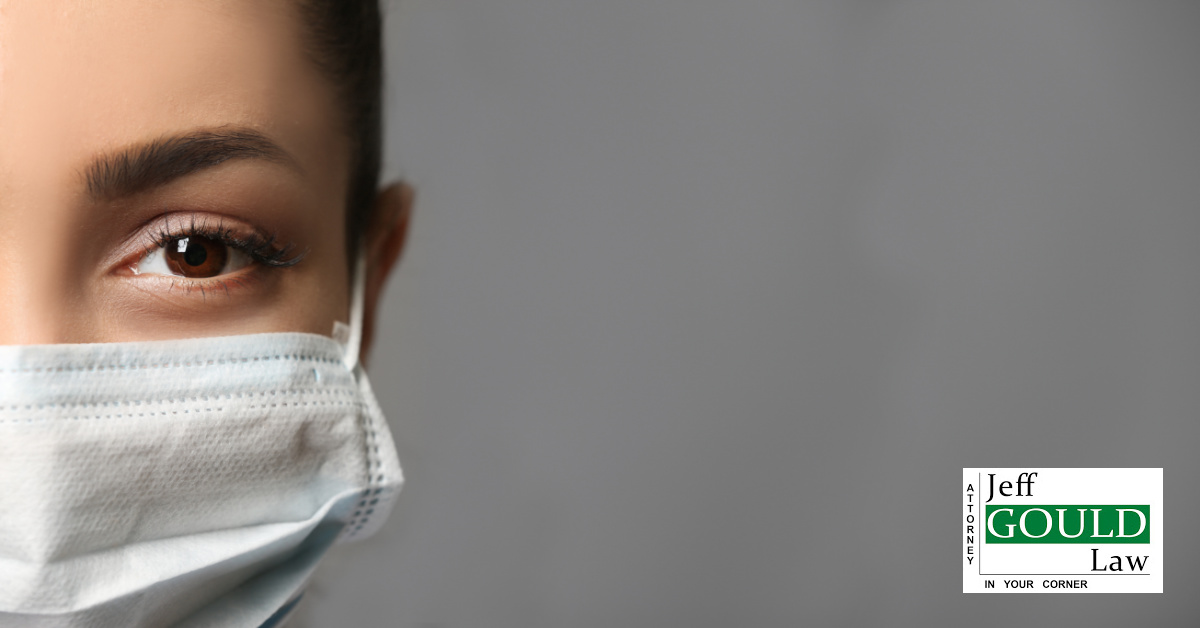Unfortunately, the U.S. can be a fairly litigious country. Given how easily COVID-19 spreads and how serious a threat it represents, you may be wondering about potential liability from infection. If you test positive for COVID-19, and you are fairly certain you know who gave it to you (who really knows with all that has been happening over the last year and as more “information” becomes truth or fiction?): in theory, you “might” be able to file a civil claim against them for damages, medical bills, lost wages or pain and suffering. Based on what we know at Jeff GOULD Law, theoretically, yes, a lawsuit could be filed. However, the success of a coronavirus-related personal injury case would depend on whether the source of the infection could be established without doubt. It is therefore unlikely we’ll be seeing many lawsuits alleging coronavirus infection. It is even less likely that such cases would succeed. Current liability laws may likely offer ample protection to the person who gave you COVID-19, and pursuing a claim against them is probably not an option.
You Can Sue or Be Sued For Almost Anything
The real question, in this instance, is not if you can get sued for infecting someone else with the coronavirus. YOU or I can, could be, or might be sued. The real legal issue is whether or not someone can sue you and present a viable personal injury case based on that allegation. Again, theoretically, it is possible, but it is also very unlikely.
Potential Lawsuits Resulting From Infection
Let’s generally discuss this hypothetical. If someone were to file a personal injury suit against you, alleging that you infected them with coronavirus, they would likely have one of two potential arguments or “causes of action.” They are negligence or battery; let’s take a closer look at both.
Negligence
In order to successfully sue someone for harm resulting from negligence, the injured person (the plaintiff) must prove four things:
- Duty of care. Within the context of a lawsuit, everyone has a duty of care to act in a reasonable manner to avoid infecting others.
- A breach of that duty. For instance, if you know you have coronavirus, but you do not self-quarantine or practice social distancing, this might be a breach of your legal duty. In other words, a failure to exercise reasonable care.
- Causation. This is one of the trickiest aspects of a successful lawsuit. Causation requires that the plaintiff prove they were infected by you, a nearly impossible task. Short of walking into a store, announcing you have COVID-19, and spitting on people, it’s going to be hard to prove you were the source of their infection. Even in that extreme example, proving one-to-one infection would still pose a challenge. There is no way to prove they were not infected by a cashier, shopping cart, fellow customer, or any one of the seemingly endless potential transmission sources before or after their store visit.
- Damages. If the plaintiff became ill enough to receive hospital treatment, this element might be clearly-established. But most people who contract COVID-19 can care for their infection at home. This means short of extensive medical care or death, damages awarded from a coronavirus infection lawsuit may not be enough to justify the time and expense of legal proceedings.
Battery
Unlike negligence, battery is considered an intentional tort, meaning it is a wrongful act done on purpose. Civil battery can be claimed if the offender engages in intentional conduct that is harmful, offensive, or results in harmful physical contact with another person. Let’s look back to the hypothetical example of entering a store and announcing you have coronavirus before spitting on people. Even without the pandemic, this could be considered civil battery because you are acting in an intentional way that results in physical contact with another person. And it’s safe to say that spitting on someone else is considered offensive contact. Without the risk of infection, damages from this example of battery would be minimal. The harm, in this case, is most likely psychological, making suing someone primarily an act of principle, as opposed to an effort to obtain compensation. Now let’s assume that your spitting on someone results in their infection with coronavirus. Here we have more potential for damages, especially if the victim requires hospitalization or dies from the infection. However, the potential for damages would be relatively small if the plaintiff only suffered minor symptoms and had an easy recovery.
Do You Have a Case?
Due to the level of contagiousness and rapid spread of the coronavirus, it may be nearly impossible to prove that you contracted the virus from someone in particular. This is just a “general” informational discussion of a hypothetical – the what-ifs: and, the topic while interesting, is complex and beyond the scope of any claims/cases that can or will be or would ever be handled at our office. However, if you have any questions regarding a personal injury claim arising from an auto accident, dog bite, or wrongful death, let Jeff GOULD Law help you determine your next steps and options moving forward. Contact us today to schedule a consultation. Our office handles personal injury, DUI, and criminal law. We are the Attorney in Your Corner, and we’ll fight for you!
DISCLAIMER: The information on this blog/site is NOT, nor is it intended to be, legal advice. It is for general informational use only. You should consult an attorney for advice regarding your individual situation. Further, this information does not create an attorney-client relationship.


